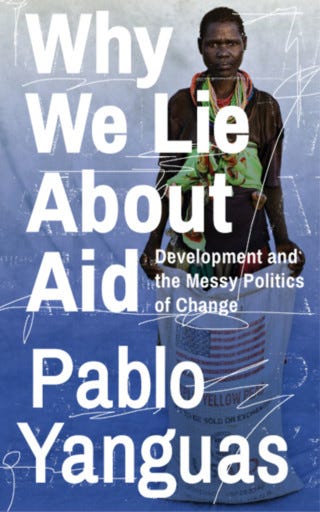Nothing is what it seems
Open CoLab
This is the Open CoLab newsletter. Or is it? Wait… yes, it definitely is.
Here in New York, April gives us a glimpse of spring. But winter might still hit us with another blizzard just for fun, or we could jump straight to summer. Likewise for the newsletter, this month is all about when appearances don’t match reality.
Nothing is what it seems.
There's a term borrowed from biology that's useful in social change work: isomorphic mimicry. It's what happens when one species develops features to look like another species. For example, a non-poisonous tree frog might evolve to match the color patterns of its poisonous cousin, so predators leave them both alone.
The same mimicry happens when organizations respond to outside forces to make themselves look like something they're not: like an anti-corruption commission that's rendered toothless against powerful interests, or a corporate-funded "astroturf" campaign that pretends to have grassroots legitimacy.
It's easy to point out contradictions when we sit outside institutions or disagree with their goals. But do our own organizations ever claim to be one thing, while acting in another way? And is that always a bad thing?
Highlights and lowlights
College admissions scandal and why meritocracy makes you a bad person.
Donor-advised funds are not charities, but they're also not not charities.
Remaking capitalism at three levels: organizational, local, and macro.
Political polarization: Can we all get along? At least on Wikipedia?
Book review: Why We Lie About Aid (by Pablo Yanguas).
Telling more honest stories about professional success.
And a bricolage of other stories.
There is no spoon: The Matrix, released 20 years ago this week, has managed to hold meaning for both the trans community and anti-feminist "men's rights" activists.
Elite colleges and the myth of meritocracy
Here in the United States, the admissions scam gave us something that truly brought the country together: shared villains. This story had something everyone could hate. Rather than recapping details here, I’ll recommend former college counselor Caitlin Flanagan's "They Had It Coming" as some of the best writing I've seen on the indictments (or on any recent topic, for that matter).
But while the accused and the colleges were all here in the United States, elite admissions is a global game. So I appreciated Rohan Venkataramakrishnan's twist: how this scandal would be covered if it happened in the "third world".
Many have pointed out that the real scandal isn't a few elites rigging the process, but the ways the whole process is rigged for elites across the board. A trio of education researchers at USC (one of the target schools in the case) described how affluent parents provide test prep classes, enrichment activities to bolster resumes, admissions coaching, legacy connections, and more. Add how wealth brings access to athletics and extracurriculars and there was never a level playing field to begin with.
In college admissions and elsewhere in life, meritocracy turns out to be at least partially a myth: success may stem from merit, but merit is fueled by privilege and luck. What's more, there’s evidence that believing the world is a meritocracy makes you a worse person. You become more selfish and discriminatory, and learn to justify other people's failures as signs of their personal defects. In contast, reminding people of the role of luck in their lives increases their generosity.
Here's a look at the psychology of rich parents acting badly, due to a sense of entitlement and invulnerability to consequences, mixed with anxiety about maintaining status and (in the case of admissions) a sense that they're acting on their children's behalf, rather than their own.
Only slightly related: this review of HBO's documentary on Elizabeth Holmes and Theranos points out that focusing on individual moral failing when looking at major scams usually misses the enabling context.
Donor-advised funds: Charities? Or... ?
The largest charity in the United States isn't one most people would guess. It’s not the Salvation Army or the United Way. It’s Fidelity Charitable: a "donor-advised fund" (DAF) managed by the finance company of the same name. It has $21 billion in assets and made $5.2 billion in grants last year, making it larger than most foundations (for comparison, the Gates Foundation has $50 billion in assets and made $4.7 billion in grants).
But DAFs aren't foundations: they're more like pass-through accounts. Donations made to DAFs can be counted for tax deductions in the year they're made, but then the DAF holds the funds until the donor advises it to make a donation. Due to the tax benefits and the lack of requirement to disperse, Fidelity and other finance companies (Goldman Sachs, Vanguard, etc) run the largest DAFs.
They have another feature: secrecy. That's been highlighted recently by Sludge's reporting on how Fidelity and other large DAFs are funding hate groups with nearly $11 million, while keeping the original donors anonymous. The hate groups are eligible because they themselves qualify as 501(c)(3)s under the tax code and the DAFs have no policies against funding hate. Following Sludge's reporting, the Amalgamated Foundation and others launched the Hate Is Not Charitable campaign calling on DAFs to enact policies against funding hate groups.
All of which raises the question: are DAFs are truly "charities"? They've hacked the regulatory requirements of nonprofits to make micro-foundations with less accountability. The good work done by a few might not justify the tradeoff.
Want more on DAFs?
Inside Philanthropy also took a recent look at Fidelity and others.
A former DAF officer blasted the incentive structure and called for requiring higher payouts.
The California Association of Nonprofits backed a state bill to regulate DAFs.
National Philanthropic Trust does an annual report on DAFs.
Could capitalism be…something else?
Four disparate stories point to different ways of re-inventing capitalism.
At the level of organizations: franchising worker cooperatives. Focusing on the domestic work sector, Brooklyn's Center for Family Life is using a franchise model to overcome the hurdle that scale presents to co-ops.
At the level of cities: a democratically controlled investment fund. Boston's Ujima Project has raised $500k (and set a goal of $5 million) for projects with public benefits in communities of color. The fund offers better returns for less wealthy investors, and draws on participatory budgeting and participatory grantmaking approaches to choose investments.
And at the macro level: a primer on Modern Monetary Theory. This is a good summary article on an idea feels dense to non-economists, but is getting increasing political traction in the United States for its potential to justify progressive spending priorities like Medicare for All and the Green New Deal.
Political polarization: not so bad after all?
A few researchers investigated how political polarization affects collaboration on Wikipedia. In a relatively dense research article in Nature, they describe how they compared article quality to the political mix of the article's editors. (For a less technical version, check out this interview with two of the researchers.)
Their takeaway was that ideological diversity, and even polarization, leads to better outcomes. This echoes other work showing that diverse teams are smarter and more innovative, though sometimes members are less comfortable. It feels like a ray of hope in polarized times, where even basic facts seem open to question.
But the findings come with a less hopeful caveat: the Wikipedia study was done in the context of an overarching institution whose enforceable norms encourage cooperation, as are most studies of diversity in team performance. Unfortunately, our politics increasingly involve withdrawing from or de-legitimizing common institutions. Without something pulling us back together, there's a risk that polarization drives divisions like ketchup comes out of a bottle: little by little, then all at once.
Book: Why We Lie About Aid
This month's theme had me flipping Why We Lie About Aid, by Pablo Yanguas. The book breaks down how development aid debates in donor countries are rarely about development, but are instead driven by the donor's domestic politics. Yanguas combines this with case studies of how change happens in aid-receiving countries (short answer: also politics) and a rethinking on the role aid can play in those processes.
The book packs in a lot for practitioners and scholars, starting with the case studies. Of the many ideas Yanguas puts forward, one of my favorites is his call for "analytic eclecticism" when tackling messy problems. He also doesn't shy away from the inside politics of reform at institutions like the World Bank.
My only critique: the book failed to connect its ideas with the broader context of a "post-truth" world. Yanguas's short answer to his title's question is that we lie about aid "because it is very hard not to." Leaving me wondering: okay, but then why do we lie about everything? You could say the entire aid industry suffers from isomorphic mimickry, but then so does, say, a criminal justice system that ignores white-collar crime while arresting and killing poor people of color. Sadly, aid isn't unique in pretending to be one thing while doing something else.
More from the aid and development sectors
Getting beyond the inner circle: Humanitarian news agency IRIN has relaunched as The New Humanitarian, with the goal of expanding its reach beyond the aid industry. Nieman Lab describes the transition.
When words aren't what they seem: Sarika Bansal describes her personal mission to kill jargon, taking aim at the international development sector.
Data ethics: Last month’s newsletter mentioned the WFP-Palantir deal that’s making many people uncomfortable. For more, see this summary of a recent discussion of the ethics of humanitarian data sharing, from Linda Raftree.
Our so-called successes
There's a certain kind of brand story that fills the "About Us" sections of countless social enterprise websites.
It starts with a hero who dared to tackle an overlooked problem. It ends with a plan to scale their solution globally. But in between, it glosses over countless advantages: funds raised from family members, introductions made by college roommates, risks taken with the knowledge of a comfortable fallback, and more.
That someone with resources puts them to use in pursuit of a better world is laudable. That those privileges get erased from their story is not.
Such omissions are often unintentional, as privilege can be invisible to those who have it. Nevertheless, the stories we tell matter. They shape our expectations and influence norms. Whether about our careers or our organization's successes, telling incomplete stories perpetuates the myth that merit alone matters and that failure signals unworthiness.
I'd like to challenge us to tell more honest stories about our work, complete with failure and success, with what we believe we've earned and what we can acknowledge we didn't.
Bricolage (stray pieces)
How can advocacy organization win today? MobLab’s Michael Silberman calls for redefining membership (beyond lists and clicktivism, to decentralization and volunteer leadership), redefining storytelling (digital content to transform culture and norms), and redefining the organization (for adaptability, experimentation, and collaboration).
CIVICUS released its annual State of Civil Society Report. Noting the strength of regressive forces, it calls for civil society to promote economic democracy, mainstream good governance and democracy work, and assert the value of multilateralism. (Relatedly: International Civil Society Week is happening this week. Follow #ICSW2019 if you can't make it to Belgrade.)
What’s on the minds of “global development leaders”? A recent survey found they’re all concerned about funding and resources (of course) but beyond that, the researchers found a “startingly wide range of priorities.” (Which seems good, right? Would we want the big NGOs, donor agencies, think tanks, etc. all focused on the same things?)
When not everyone wants to speak out: Some ideas for designing introvert-friendly workshops, from Myriam Hadnes.
Learning to use feedback: A donor collaborative called the Fund for Shared Insight is developing an online tool to help nonprofits and government agencies bring client feedback into their work. Applications to join the beta test are due May 10.
Turning down toxic money: Purdue Pharma fueled the opioid crisis with its aggressive and deceptive marketing of OxyContin. But that made billions for the Sackler family. A slow backlash against the family’s philanthropic giving may have finally reached a tipping point, with museums like the Guggenheim and Tate announcing they’ll no longer accept Sackler money, and Tufts University asking an outside investigator to review how donations influenced academics. Other recipients may be asking similar questions, but rejecting new funding will be easier than returning old gifts.
New term of the day: Corruption anxiety
“the knowledge that society can be and has been manipulated to favor the powerful, at your expense"
— Coined by journalist/technologist Dayo Olopade
That’s all for this month! Thanks for reading. Pick an option below to let me know you got to the end. As always, feel free to hit reply with any feedback.
- Dave
*|POLL:RATING:H|* How likely are you to recommend this newsletter to a friend or colleague? *|END:POLL|*






